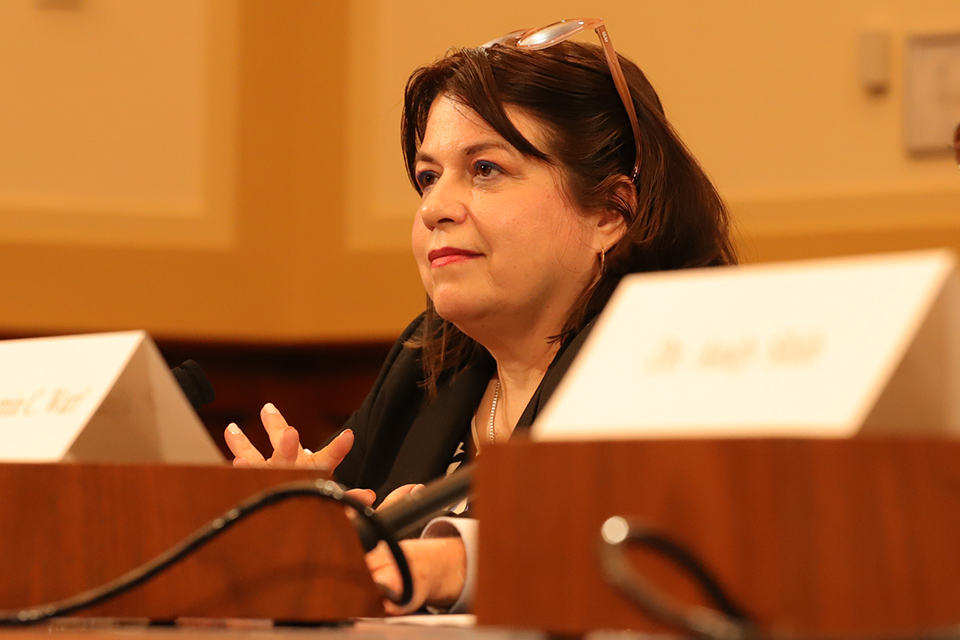- December 30, 2024
UTRGV Alzheimer’s disease expert testifies at U.S. House Foreign Affairs hearing

Dr. Gladys Maestre speaks in support of global brain health agenda
Dr. Gladys Maestre, director of the UTRGV School of Medicine’s Alzheimer’s Disease Resource Center for Minority Aging Research (AD-RCMAR), recently shared her expertise on Alzheimer’s disease and related dementias (ADRD) when she was invited to testify before the U.S. House of Representatives.
Maestre, a professor at the Department of Neuroscience at UTRGV School of Medicine, participated on Nov. 20 in the House Foreign Affairs, Subcommittee on Global Health, Global Human Rights, and International Organizations hearing titled “Meeting the Challenges of Global Brain Health: Diagnosis and Treatment for the 21st Century.”
At the hearing, U.S. Representative Ami Bera, M.D. (CA-06) alongside Reps. Brian Fitzpatrick (R-PA-01) and Young Kim (R-CA-40) introduced the bipartisan Global Alzheimer’s Initiative Now (GAIN) Act.
According to statistics shared by Bera at the hearing, it is estimated that the number of people living with Alzheimer’s disease and dementia is projected to triple from more than 55 million people today to more than 152,000,000 by 2050.
The national plan to address Alzheimer’s disease was recently reauthorized and signed into law by President Joe Biden: the NAPA Reauthorization Act (H.R. 619 / S. 133) and Alzheimer’s Accountability and Investment Act (H.R. 620 / S. 134).
Maestre, also a co-director of the South Texas Alzheimer’s Disease Research Center, said because of several acts first enacted in 2014, investment in Alzheimer’s research increased significantly yielding seminal advances in diagnosing and treating Alzheimer’s disease.
“We now know that Alzheimer’s begins 20 years or earlier before memory loss or other symptoms develop,” Maestre said. “We are now looking forward to therapeutics that will begin early enough to really stop the progression to the disease – and moving toward incorporating biomarker detection for Alzheimer’s disease into routine preventive healthcare.”
GLOBAL RESEARCH COLLABORATION
The capability to detect the disease before the symptoms appear depends largely on “biomarkers,” or genetically tied molecules, explained Maestre.
However, most studies looking for biomarkers have focused on European populations, limiting their applicability to other groups.
“The APOE (apolipoprotein E ) gene – the most common genetic risk factor for Alzheimer’s in Europeans – has minimal impact on African American or Hispanics,” she said. “Africa is the most genetically diverse continent and offers a vast, yet underutilized source for studying how genetic and environmental factors contribute to chronic and infectious diseases.”
She advocated for a global health strategy that will also benefit low-resource locations like the Rio Grande Valley in South Texas.
“The social determinants of health that we are experiencing on the border are in many ways related to what’s happening in low- and middle-income countries,” Maestre said.
DEVELOPMENTS IN THE RGV
In the last 10 years, the South Texas ADRC’s researchers contributed to the development of Leqembi (lecanemab), which in 2023 was one of the first drugs to get FDA approval for the treatment of ADRD. Like Donanemab (Kisunla™), FDA-approved in 2024, these drugs aim to target plaque that forms in the brain, and ultimately slow progression of the disease and to reduce clinical decline. Aducanumab (Aduhelm), which was FDA-approved in 2021, is being discontinued in 2024.
Maestre says the emerging medications are a promising step in the right direction.
“We are closer, but it’s not a ‘cure,’” she said.
The center’s multi-factor research has revealed other avenues outside of medication that need to be explored to improve the quality of life for patients with ADRD and their families, Maestre shared.
“Our work in the RGV is rooted in the meaningful engagement model, which emphasizes four pillars: strong partnerships, expanded knowledge, improved health programs and policies and thriving communities,” Maestre said.
Maestre said with more than 250 North American universities offering global health education, the U.S. has the means to develop a pipeline of experts in both brain health and foreign affairs.
“We have the technology. We have the infrastructure. It’s the leadership that we need in the world,” she said. “I think that we have a lot of pieces to really accelerate the discoveries that we need to bring back home.”

